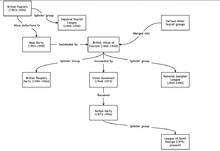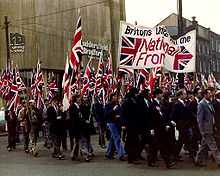List of British fascist parties
| Part of a series on |
| Fascism |
|---|
 |
|
Topics
|
|
Literature
|
|
Organizations |
|
Lists |
|
Although Fascism in the United Kingdom never reached the heights of many of its European counterparts, British politics after the First World War saw the emergence of a number of fascist movements, none of which ever came to power.
Pre-War

A flowchart showing the history of the early British fascist movement
A number of fascist movements emerged before the Second World War. Amongst those that were founded were:
- The British Fascists, founded in 1923 as the British Fascisti by Rotha Lintorn-Orman, one of the very few women to ever lead an avowedly fascist movement. Initially they had only a limited political platform but supported Italian fascism from 1931 to their demise in 1936.
- The National Fascisti, a splinter group of the BF founded in 1924 that from the outset fully supported the tactics of Benito Mussolini. They fell apart after another group, the British National Fascisti, broke away from them.
- The Imperial Fascist League, also a breakaway from the BF, formed by Arnold Leese in 1929. After Adolf Hitler came to power in Germany they embraced Nazism.
- The British Union of Fascists, formed in 1932 by Oswald Mosley as a successor to his New Party. The largest British fascist party, it absorbed members from other groups and called on the support of leading figures including members of the House of Lords, Commons, many Knights of the realm, as well as, for a time, the Daily Mail newspaper.[1][2]
- The National Socialist League, a pro-Nazi breakaway from the BUF, formed in 1937 by William Joyce and John Beckett. It was wound up in 1939 when Joyce emigrated to Nazi Germany.
Post-War
After the Second World War a handful of groups emerged which looked directly to fascism and Nazism for their inspiration. Those who have openly done so (in contrast with parties which merely describe themselves as aligned with nationalism) are:

National Front demonstration in Yorkshire, 1970s
- The Union Movement, a re-founded version of the BUF that played a pivotal role in developing the Europeanist outlook of Neo-Fascism through its Europe a Nation campaign.
- The British National Party (1960-1967), which until a split in 1962 produced pro-Nazi propaganda. (This is a different party from the current BNP, although John Tyndall was a leading member of both)
- The National Socialist Movement, a Colin Jordan-led breakaway from the BNP that was openly Nazi and was a charter member of the World Union of National Socialists.
- The Greater Britain Movement, set up by John Tyndall when he split from the NSM.
- The British Movement, a 1968 development form the NSM, which used images of Hitler and the swastika on election literature.
- The November 9th Society, a neo-Nazi organization founded by Terry Flynn in 1977. It also organizes under the name British First Party.
- The National Socialist Action Party, a minor splinter group from the BM formed in 1982.
Bibliography
- R. Benewick, Political Violence and Public Order, London: Allan Lane, 1969
- M. Cronin (ed.), The Failure of British Fascism, Basingstoke: Macmillan, 1996
- R. Eatwell, Fascism : A History, London: Pimlico, 2003
- R. Thurlow, Fascism in Britain, London: IB Tauris, 1998
- M. Sarkisyanz, From Imperialism to Fascism: Why Hitler's India was to be Russia, New Delhi: Deep & Deep Publications, 2003
References
- ↑ Martin Pugh, 'Hurrah for the Blackshirts!' Fascists and Fascism in Britain between the Wars (London 2005)
- ↑ RJB Bosworth, "The British Press, the Conservatives, and Mussolini, 1920-34", Journal of Contemporary History, 1970
| ||||||||||||||||||||||||||